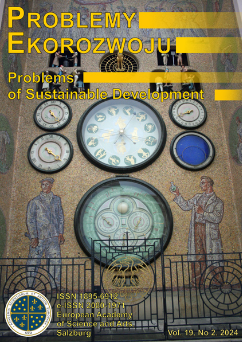Construction of China’s Carbon Financial Accounting System from the Perspective of Sustainable Development
Shuwen Li
yin75742@gmail.comUniversity of Malaya, Department of Accounting, Faculty of Business and Economics, Kuala Lumpur (Malaysia)
Abstract
Carbon Financial Accounting System highlights the importance of carbon finance and carbon accounting in China's efforts towards sustainable development and reducing its carbon footprint. The article discusses the need to manage and trade carbon assets, develop a comprehensive carbon financing system, and account for and report carbon activities. It proposes constructing a carbon accounting framework that includes all key sources of carbon emissions and carbon sequestration capacity. The article emphasizes the need to integrate carbon accounting into a company's operations and establish a comprehensive carbon finance ecosystem as a critical component of national strategic development. To achieve this, the Chinese government must promote CDM initiatives and relevant policies, enhance support to intermediary institutions, centralize the management of CDM projects, and strengthen carbon financing regulations. The article suggests establishing carbon trading and pricing mechanisms and improving the carbon trading system to create an effective carbon finance regulatory structure. Additionally, a carbon accounting system is required for financial and accounting oversight to support green and low-carbon growth, hence strengthening carbon accounting and reporting regulations of companies. The incorporation of carbon exchange, carbon funds, and carbon sinks banks are also essential in enhancing the financial accounting system.
Keywords:
carbon, finance, accounting, sustainable developmentReferences
ALSAIFI K., ELNAHASS M., SALAMA A., 2020, Carbon disclosure and financial performance: UK environmental policy, Business Strategy and the Environment, 29(2): 711-726.
DOI: https://doi.org/10.1002/bse.2426
Google Scholar
DENG L. et al., 2017, Past and future carbon sequestration benefits of China’s grain for green program, Global Environmental Change, 47: 13-20.
DOI: https://doi.org/10.1016/j.gloenvcha.2017.09.006
Google Scholar
FRIEDLINGSTEIN P. et al., 2022, Global carbon budget 2021’, Earth System Science Data, 14(4): 1917–2005.
Google Scholar
HAZAEA S.A. et al., 2022, Past, present, and future of carbon accounting: Insights from scholarly research, Frontiers in Energy Research, https://doi.org/10.3389/fenrg.2022.958362.
DOI: https://doi.org/10.3389/fenrg.2022.958362
Google Scholar
HONGCHUN Z., 2010, Development of Carbon Market in the World and its Implications, Chinese Soft Science, https://api.semanticscholar.org/CorpusID:156316257.
Google Scholar
HUA F. et al., 2018, Tree plantations displacing native forests: The nature and drivers of apparent forest recovery on former croplands in Southwestern China from 2000 to 2015, Biological Conservation, 222: 113-124.
DOI: https://doi.org/10.1016/j.biocon.2018.03.034
Google Scholar
HUANG Y. et al., 2022, The role of China’s terrestrial carbon sequestration 2010–2060 in offsetting energy-related CO2 emissions, National Science Review, 9(8): nwac057.
DOI: https://doi.org/10.1093/nsr/nwac057
Google Scholar
KAIFENG L., CHUANZHE L., 2011, Construction of carbon finance system and promotion of environmental finance innovation in China, Energy Procedia, 5: 1065-1072.
DOI: https://doi.org/10.1016/j.egypro.2011.03.188
Google Scholar
MARLOWE J., CLARKE A., 2022, Carbon accounting: A systematic literature review and directions for future research, Green Finance, 4(1): 71-87.
DOI: https://doi.org/10.3934/GF.2022004
Google Scholar
QIU S., WANG Z., LIU S., 2021, The policy outcomes of low-carbon city construction on urban green development: Evidence from a quasi-natural experiment conducted in China, Sustainable Cities and Society, 66: 102699.
DOI: https://doi.org/10.1016/j.scs.2020.102699
Google Scholar
YANG J., LUO P., 2020, Review on international comparison of carbon financial market, Green Financ, 2: 55-74.
DOI: https://doi.org/10.3934/GF.2020004
Google Scholar
ZENG S., ZHANG S., 2011, Literature review of carbon finance and low carbon economy for constructing low carbon society in China, Low Carbon Economy, 2(01): 15.
DOI: https://doi.org/10.4236/lce.2011.21003
Google Scholar
ZHAO X. et al., 2022, Challenges toward carbon neutrality in China: Strategies and countermeasures, Resources, Conservation and Recycling, 176: 105959.
DOI: https://doi.org/10.1016/j.resconrec.2021.105959
Google Scholar
ZHOU K., LI Y., 2019, Carbon finance and carbon market in China: Progress and challenges, Journal of Cleaner Production, 214: 536-549.
DOI: https://doi.org/10.1016/j.jclepro.2018.12.298
Google Scholar
ZHU L. et al., 2022, Single-junction organic solar cells with over 19% efficiency enabled by a refined double-fibril network morphology, Nature Materials, 21(6): 656-663.
DOI: https://doi.org/10.1038/s41563-022-01244-y
Google Scholar
ZHU N. et al., 2020, Green financial behavior and green development strategy of Chinese power companies in the context of carbon tax, Journal of Cleaner Production, 245: 118908.
DOI: https://doi.org/10.1016/j.jclepro.2019.118908
Google Scholar
Authors
Shuwen Liyin75742@gmail.com
University of Malaya, Department of Accounting, Faculty of Business and Economics, Kuala Lumpur Malaysia
Statistics
Abstract views: 254PDF downloads: 370









